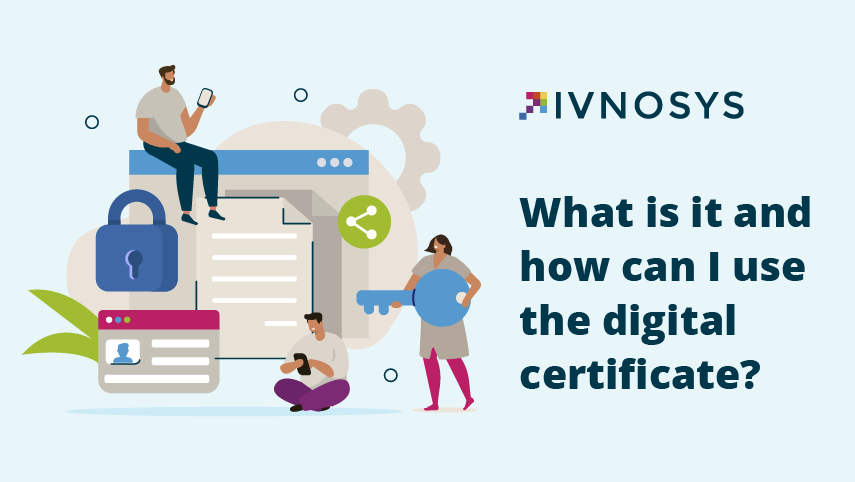
What is it and how can I use the digital certificate?
Escrito por: Marketing Team Fecha Friday 30, April 2021 Categoría: General
You are probably familiar with it and you may have already had to use your digital certificate to access your employment history report, check your taxes or carry out any type of online procedure with the Public Administration.
But do you know exactly what a digital certificate is and what kind of procedures do you need it for?
The digital certificate, your electronic ID
We can understand the digital certificate as an electronic ID that identifies us digitally and allows us to carry out transactions on the Internet. Depending on the task we need to carry out (signing a document, applying for a grant from the local council, etc.), we must use a specific type of certificate. In the case of companies, the most commonly used are the certificates of representation with the Public Administrations and the certificate of electronic signature.
Its use is becoming more and more widespread in companies, especially since the pandemic. Thus, more than 80% of users have carried out telematic procedures with the Public Administration, for which they needed a digital certificate. What is the reason for this increase in the use of digital certificates? Quite simply. Until now, when we needed to carry out a procedure with a public organisation, we used to go to the offices and show our ID card. In the same way that we showed our ID card in this process of physical identification, we have to use the digital certificate to do it electronically.
Since the pandemic, more than 80% of users have carried out telematic procedures in the Public Administration, for which they needed a digital certificate.
With the digital certificate we can access private and confidential information, which is really important in the case of companies. If a person had the digital certificate representing a company in their hands, they could access tax data and carry out transactions unknowingly on behalf of the company.
Digital certificates under Law 6/2020
The increase of electronic transactions through the use of digital certificates and electronic signatures has led to their regulation with Law 6/2020, on electronic trust services, which is an adaptation of the European eIDAS regulation.
Among the points dealt with, Law 6/2020 recognises a validity period of 5 years for digital certificates and the possibility of renewing them only once to guarantee maximum security.
>> We recommend: eIDAS Regulation: the security of electronic signatures
How to protect the digital certificate
To work online securely, it is necessary to use a qualified digital certificate, which means a certificate issued by a Certification Authority. This is the case of organisations such as the FNMT, Camerfirma or Ivnosys.
A qualified digital certificate, also known as a “qualified certificate of electronic signature”, is a digital certificate generated by a secure signature creation device known as QSCD (Qualified Signature Creation Device) and which has been issued by a Qualified Trust Service Provider, such as Ivnosys.
This entity issues the certificates and grants legal validity to all uses made with them. In addition, there are tools such as IvSign that are committed to greater security control.
Many companies install digital certificates on employees’ computers, which means:
- Losing the digital certificate if the computer is lost or stolen
- Install a new certificate every time there is an incorporation in the company
- Change certificates when there are changes in staffing levels
- Install a certificate on the computers of several employees when they need to use it
However, with IvSign it is possible to stop all these situations as the certificates are issued from the platform itself and stored directly in the cloud. Thanks to this, employees can use them from any device and the company can assign their use, controlling in real time who uses them and when, thanks to the auditing process incorporated in the platform.
Uses of the certificate: online procedures with the Public Administrations and digital signature of documents
Among the most frequent uses that companies make with the digital certificate is the management of electronic procedures with the Public Administration. This is due to the obligatory compliance of companies and professionals with Law 39/2015. This regulation only allows procedures to be carried out by electronic communication, which affects the management of electronic notifications.
Thus, to consult notifications and carry out any task through websites of public administrations, it is necessary to be accredited with a digital certificate. Automating these procedures is also possible thanks to management platforms such as IvNeos.
Another principal use is electronic signatures. Paper signatures seem to be a thing of the past. Companies now use electronic methods to sign contracts or any type of document. Thus, it is much more convenient and agile to send a document by e-mail and receive it electronically signed. It is no longer necessary to wait for a customer or employee in person to complete formalities, and this greatly optimises the company’s resources, both in terms of time and money.




